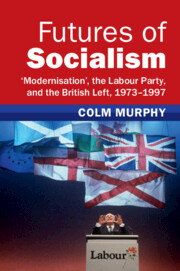Book contents
- Futures of Socialism
- Modern British Histories
- Futures of Socialism
- Copyright page
- Contents
- Figures
- Tables
- Acknowledgements
- Introduction: The Plural Modernisations of the British Left
- Part I Social Democracy and the Challenge to the Nation State
- Part II Identities and ‘Modern Socialism’
- Part III The Search for a Modernising Social Democracy
- 5 ‘A Modern Democracy’
- 6 White Heat to Interactive Whiteboard
- Conclusion: Contested Futures of Socialism in the Late Twentieth Century
- Bibliography
- Index
Conclusion: Contested Futures of Socialism in the Late Twentieth Century
from Part III - The Search for a Modernising Social Democracy
Published online by Cambridge University Press: 25 May 2023
- Futures of Socialism
- Modern British Histories
- Futures of Socialism
- Copyright page
- Contents
- Figures
- Tables
- Acknowledgements
- Introduction: The Plural Modernisations of the British Left
- Part I Social Democracy and the Challenge to the Nation State
- Part II Identities and ‘Modern Socialism’
- Part III The Search for a Modernising Social Democracy
- 5 ‘A Modern Democracy’
- 6 White Heat to Interactive Whiteboard
- Conclusion: Contested Futures of Socialism in the Late Twentieth Century
- Bibliography
- Index
Summary
The conclusion considers the wider significance of the book’s arguments. The concept of ‘modernisation’ was a potent resource for projects for social-democratic renewal over the late twentieth century. Many had the potential to become defining influences on a Labour government – even if, at turning points in the early 1980s, the late 1980s and the early 1990s, they lost out due to a combination of social and economic, intellectual, institutional, and political forces. This means that the rise of New Labour was not inevitable and that its opponents were not straightforwardly ‘traditionalist’. It also means, however, that New Labour’s leaders drew heavily from the left when forging their own agenda, including policies and institutions that endure today. This has implications for the histories of Britain after the 1970s: the rise of neoliberalism, though important, should not obscure other pivotal forces, especially deindustrialisation, constitutional agitation, and popular individualism. The conclusion ends by using this history to suggest that ‘modernisation’ is an idea that is unusually prominent in the tradition of social democracy.
Keywords
- Type
- Chapter
- Information
- Futures of Socialism‘Modernisation', the Labour Party, and the British Left, 1973–1997, pp. 266 - 277Publisher: Cambridge University PressPrint publication year: 2023



